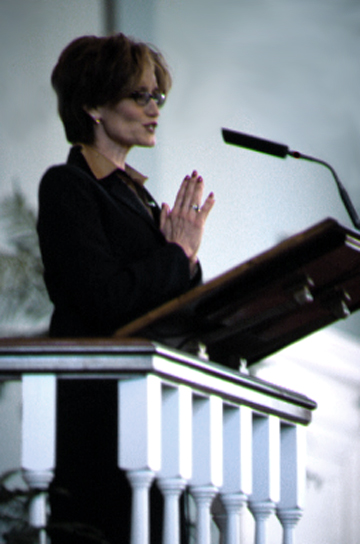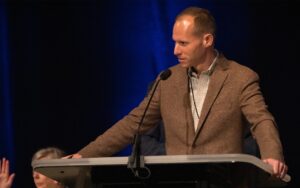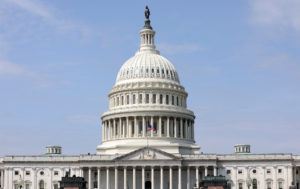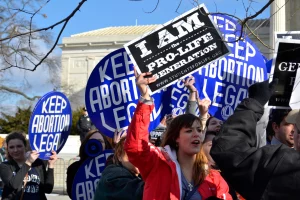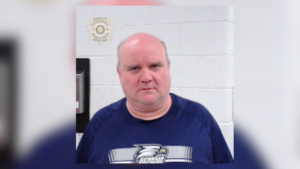
DALLAS (BP)–When secular reporters write about women in ministry in the context of Southern Baptist life, they don’t bother calling Susie Hawkins, Simone Monroe or Kathy Sibley. Instead, they pick the rare woman who pastors what is typically a small congregation with few ties to the SBC. That phone call will provide comments about male-dominated leadership oppressing and silencing women who make up the majority of the 16-million-member convention.
If you had a chance to hear from the three Texas women who spoke at a recent Criswell College forum, you’d hear about the opportunities they’ve had to minister to groups small and large, locally and internationally, influencing women and men. Between the three women, they recounted 30 different types of ministries they have conducted in the context of Southern Baptist life.
“Women participate equally with men in the priesthood of all believers,” said Monroe, an administrative assistant at Criswell College. “Their role is crucial. Their wisdom, grace and commitment are exemplary. Women are an integral part of our Southern Baptist boards, faculties, mission teams, writer pools and professional staffs. We affirm and celebrate their Great Commission impact.”
“Few subjects have generated as much heat, though often with as little light as the subject of the proper role of women in ministry,” said Kathy Sibley, a former Southern Baptist missionary who now serves as assistant to the president of Criswell College. “For us, the starting point for any discussion is not societal standards or cultural norms — it is the authoritative Word of God.”
The three women cited their own ministries that involved music, hospitality, missions education, administration, discipleship, mentoring, evangelism, radio and television broadcasts, Christian education, church planting, retreat ministry, teaching, writing, counseling and work with students. “We have also served as wives, mothers, grandmothers, students, missionaries, pastors’ wives and on church staffs as pianists, young married ministry directors and women’s ministry directors,” Monroe told the audience of students.
The overwhelming passage of a revised Baptist Faith and Message doctrinal statement in 2000 drew increased media attention to the role of women in ministry within the SBC. While the revision affirmed women as being “gifted for service in the church,” reporters and critics zeroed in on the clarification that “the office of senior pastor is limited to men as qualified by Scripture.”
“Nowhere does it say that women can’t proclaim the Gospel,” Hawkins explained in an earlier interview, careful to distinguish between women serving in an authoritative pastoral role and women proclaiming the Gospel.
“In our own Southern Baptist tradition we have the obvious examples of missionaries Lottie Moon and Bertha Smith who were used greatly by God.”
Answering those who use Mary Magdalene as an example of a female spiritual authority, Hawkins reminded, “She was their co-laborer, their partner in spreading the Gospel.”
When the BF&M study committee on which Hawkins served specified the restriction on the office of senior pastor, they chose not to comment on women performing a preaching role outside of local church life.
“Upon the discussion of the issue of women in ministry, I am eager for others to know that the men on the committee were more than willing to hear the women’s perspective,” Hawkins said.
A LOOK AT HISTORY
In her presentation at Criswell College, Hawkins reminded listeners that when Shubal Stearns influenced early Baptists in America with his preaching at Sandy Creek, his sister Molly Stearns Marshall also was delivering sermons on the frontier before and after the Revolutionary War. Much of missionary heroine Lottie Moon’s church planting efforts in China involved proclaiming the Gospel, and yet, she anxiously discipled newly converted men who could assume leadership of local churches.
International Mission Board President Jerry Rankin retraced the steps of Moon throughout China and wrote an account of his study of her life. “It is very clear and well-referenced that as Lottie Moon went on itinerant witnessing tours to the villages, teaching the Bible and yes, probably preaching, that she would not allow any men to be present.” That didn’t prevent men from being saved through her ministry, Rankin noted, as they listened through the window to her message.
He added that Moon called upon a male Chinese evangelist to work alongside her, performing baptisms of converts and other pastoral roles. “Nothing prevents a woman from engaging in any kind of church-related ministry,” he said, noting the scriptural restriction against holding a church pastorate as the only limitation.
When Ethics & Religious Liberty Commission President Richard Land needs an example of a woman ministering scripturally he cites Shannon Royce who has served as the ERLC’s legislative counsel and director of government relations. Royce’s mother, Barbara O’Chester, a Southern Baptist pastor’s wife from Austin, Texas, developed a model for retreat ministry that has been embraced by Southern Baptists.
“That is not in contradiction with the BF&M,” Land said of Royce’s ministry. “The ERLC is not a church and she is not a pastor, but she is gifted for service.” Women serve in various administrative and teaching roles at Southern Baptist seminaries and entities, he added.
Land said SBC boards typically hire those called to a pastoral office when filling top vacancies at boards and agencies. “But I don’t think there’s a theological reason why a woman could not be the head of an SBC entity, as long as it’s not a church.”
Tapping women for key leadership positions as Land did at the ERLC is not the norm in Southern Baptist life. The last published listing of staff directories for SBC entities in 2002 confirms that few women are listed in top levels of management with the exception of Woman’s Missionary Union where the vast majority of the staff is female. Women hold officer-level positions at the Southern Baptist Foundation and International Mission Board. Female officers have served the Annuity Board in the past, and 50 women are employed as supervisor, manager or department-level leaders.
All of the Southern Baptist seminaries have women serving as faculty members, with Southern Baptist Theological Seminary reporting the greatest percentage of women serving in department-level supervision.
“In essence, there is no better place for a female in the Southern Baptist world than to be a missionary,” stated one IMB missionary. “Female missionaries are very active church planters. Many times, the wives have a better ministry than the husband.” While appreciative of the opportunities she found to exercise her gifts, she doesn’t see women being given the same opportunities for advancement as men on the field.
“If a woman — genuinely, with all her heart — desires to serve God and use her gifts, he’s going to show her a place to do it. If her heart’s desire is a position or office, that’s a different matter,” Hawkins said in respect to women seeking to pastor churches.
According to a study by Midwestern Baptist Theological Seminary, less than one-tenth of 1 percent of Southern Baptist churches had a woman serving as senior pastor in 2000. Of those 32 women identified, some have since resigned or severed ties to the SBC.
REMAINING TRUE TO SCRIPTURE
“For those women who feel the call to minister, no matter what that call is, they need to measure that feeling against what Scripture says,” stated Heather King in an interview when she served as director of women’s ministry for the State Convention of Baptists in Indiana. Now the director of women’s programs at Southern Seminary, King said, “We can’t base our whole lives on what we feel. We have to base it on what doesn’t change, and that’s the Word of God.”
Jaye Martin developed the HeartCall strategy for witnessing to women as the North American Mission Board’s women’s evangelism strategist. While doing door-to-door visitation for Houston’s Second Baptist Church, Martin junked her traditional witnessing outline in favor of a more conversational approach. After the approach provided a better means of meeting the woman’s spiritual needs, Martin later was questioned by the two young men who had accompanied her.
“They said, ‘I don’t know what that was, but it was not the outline,'” she recalled in speaking to a Southern Baptist Theological Seminary training session. “I said, ‘The outline? What is the outline for? The whole reason you have an outline is so that you will have an open door to share Christ.'” She showed the men how she had covered the elements of the outline in a different order and soon realized that witnessing to women involves a relational approach.
“We have to mobilize our women to get out and reach other women and to share Christ,” she said. HeartCall’s evangelism strategy does just that.
“Who better than a woman can reach other women?” asked Chris Adams, women’s enrichment ministry and ministers’ wives specialist at LifeWay Christian Resources. She counts it a privilege when women serve God to impact not only the lives of other women, but local churches and even the world.
“I have never felt limited in serving my church or denomination,” Adams said. “My calling is specific to ministering to and with women.” Citing Titus 2:3-5, Adams believes this is not only a call, but a mandate from God. She encourages women to seek where God would specifically have them serve.
“He will call and equip you to do whatever he wants you to do. He will open doors for you to accomplish his call in your life to serve him.” She suggested exploring church leadership positions that are available, talking with other women who are serving and gaining counsel from pastors. “Network and share ideas, frustrations, successes and prayers,” she counseled. “Seek training conferences and seminary classes to become equipped in specific areas of ministry. Study what God’s word says about ministry and women.”
Southwestern Baptist Theological Seminary women’s program director Terri Stovall said, “The Baptist Faith and Message 2000 is not a creed that has held women back. On the contrary, it is a confession of what is already evident in Scripture. Women are free to fully be who God intends them to be. Wow! How liberating is that!”
The program Stovall directs is a prime example of the greater attention women are receiving at Southern Baptist seminaries as they are encouraged to train for ministry.
Southern Seminary’s Heather King rejoices at the greater emphasis on training women in a seminary context and in the local church. “We must help women in the local church connect the dots between theology and practice. The very reason God gives for woman-to-woman ministry is given within the context of sound doctrine,” she said, citing Titus 2. “We must intentionally and unapologetically teach women the basic beliefs undergirding the Christian faith, because in reality it is the framework that affects lifestyle and ministry.”
She cautioned that emerging trends within Southern Baptist churches can actually suppress service by women. “We must stress that godly women are responsible to study and teach God’s Word. Many women’s ministries are too heavily supported by video-driven studies. This can stifle the development of teaching and speaking gifts and often translates into a lack of cultivating sharp study skills as well.”
King added, “I have seen women’s ministries put Bible study on hold until the next video series is available. This form of study, used alone, does nothing to encourage women to study, to write and to teach God’s Word for themselves.”
WOMEN IN MISSIONS
On an international level, women long ago achieved respect for their contributions on the mission field. Once the earliest Southern Baptist mission board changed its preference for appointing only married women, the number of female missionaries quickly outnumbered the male missionaries. IMB’s Erich Bridges wrote that Southern Baptists realized “that single members proved to be just as tough, resilient and committed to the task as their male missionary colleagues.”
Of the 5,500 representatives of the International Mission Board now serving, 3,036 are women. By one estimate, nearly 80 percent of the inhabitants of the 10/40 Window — the world’s most unreached regions, stretching from North Africa to Southeast Asia — are women and children, Bridges reported. “They live behind veils, gates, walls and other barriers — physical and psychological. Yet in many cases women hold the key to evangelizing their families and communities,” he noted.
“Women can serve in most any role,” stated Zambia missionary Bonita Wilson in the July-August 2002 Commission magazine. “Some make great strategy coordinators. A few are church planters. They’re not preaching and pastoring, but [they] work with local leaders to impact a vision to reach the lost.”
She noted the advantage female missionaries have in relating to women where cultural restrictions prohibit interaction with men. “We have appointed women doctors and nurses. We’ve had a woman who worked for an agricultural sales company and is now a businessperson in West Africa.”
Wilson added, “The board is open to women serving, whether married or single. God calls women as much as men. He wants to use the gifts He’s given. He wants to use women with a heart for the lost.”
Of the 5,304 missionaries appointed by the North American Mission Board, 2,549 are women. The work of women serving with NAMB includes a variety of assignments such as leading inner-city ministries, reaching out to specific groups such as migrants or prisoners, serving as healthcare professionals who use their skills as a demonstration of their concern, and providing literacy education.
NAMB continues to endorse female chaplains who are uniquely gifted to reach women and their families in the military, hospitals or prisons. Women serving as family and church missionaries support and cooperate in the spouse’s assignment, providing a partnership approach to ministry.
Simone Monroe believes women will find countless opportunities for ministry as they serve under the guidance of Southern Baptists’ doctrinal guidelines. “Jesus radically purged leadership of pride and fear and self-exaltation,” she explained in her presentation at Criswell College. “And He also radically honored women as persons worthy of the highest respect under God.
“This is a call for the delicate and sensitive preservation of personal dynamics that honor the headship of men without squelching the wisdom and insightfulness of women.”
–30–
Article courtesy of the Southern Baptist Texan newsjournal. (BP) photos posted in the BP Photo Library at http://www.bpnews.net. Photo titles: SUSIE HAWKINS and JAYE MARTIN.
